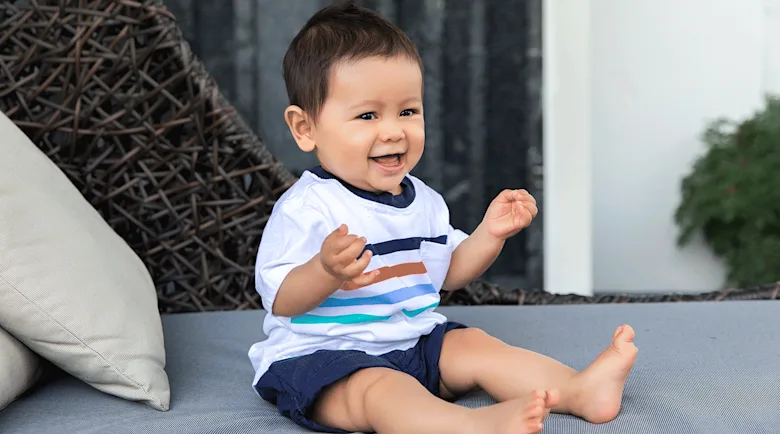49-Week-Old Baby

The countdown to toddlerhood continues as you plan baby’s first birthday, look forward to those first steps (if baby isn’t taking them already!) and continue to offer baby new foods. Here’s more of what you can expect at 49 weeks.
Growth
The average weight for a 49-week-old baby is 19.4 pounds for girls and 20.9 pounds for boys. The average length is 28.8 inches for girls and 29.5 inches for boys. As you look forward to baby’s 12-month checkup, jot down any questions you might have about growth that you’d like to bring up with your pediatrician.
Emerging skills
Baby’s working on a lot of important milestones, including their first words and drinking from an open-top cup. They’re also learning to play games with you, like pat-a-cake, and make gestures including waving bye-bye. Baby’s likely pulling up to stand and walking while holding on to furniture to practice for their first independent steps.
Feeding
A sample day of eating for baby this age might look like this: Breakfast, snack, lunch, snack, dinner—with four or five milk feeds (breast milk or formula, including one right before bed. But as long as baby seems full and happy and is tracking along their growth curve, that’s all that matters.
Sleep
Your 49-week-old should be getting around 12 to 16 hours of sleep every 24-hour period, with nine to 12 of those hours at night. Baby’s likely still napping twice a day, but those naps will start to consolidate into one after baby’s first birthday. Some babies show signs earlier, so watch for cues like spending more time awake without fussiness. But don’t rush the nap drop —chances are, you’ll spend some time in “nap limbo” and it’ll take baby a little while to fully transition to a one-nap schedule.
What are good gifts for baby’s first birthday?
You might be getting lots of questions from relatives and friends about what gifts to get baby ahead of their first birthday bash. Feel free to make suggestions—tell them whether you prefer wooden toys or practical gifts, for example. (And if you already have too many clothes, definitely feel free to say so!) Always make sure gifts are age-appropriate and safe: The American Academy of Pediatrics (AAP) says to avoid toys that can fit entirely in baby’s mouth and items with small, removable parts, including button batteries or lithium coin batteries, as they can pose a choking risk.
When can baby sleep with a stuffed animal?
Baby might have a favorite stuffed animal or lovey they tote around everywhere. But according to the AAP, you should keep baby’s sleep space clutter-free—no stuffed animals, blankets, pillows or other objects—until baby turns one, as extra objects pose a risk of SIDS (Sudden Infant Death Syndrome).
Calming an overstimulated baby
Babies can become overstimulated when they’re sick or tired, their routine is off or when they’ve been passed around to too many people. (Consider this your permission to tell your aunt to give baby back.) They might show signs like looking away, crying or fussing, clenching their fists and waving their arms and legs. You can help baby calm down by taking them to a dark, quiet room and rocking, cuddling or gently stroking them. Try to avoid screen time until baby is 18 months, as that can also contribute to overstimulation.
First steps
Seeing baby take those first teetering steps is exhilarating! But as with most aspects of baby development, there's a wide range for when babies learn to walk: anywhere from 9 to 18 months. A good sign your little one will hit this milestone soon, if they haven't already? Cruising (aka walking while holding onto furniture for support). Some ways to help encourage baby to walk: Limit the amount of time they spend in a playpen and activity saucer and try not to carry them around all the time! Baby will need plenty of opportunities to practice their steps. Introducing a push toy can also help provide a little motivation.
- Embrace the outdoors. Being a new parent is stressful, and a change of scene can be just what you need to recharge your battery. Spending time in nature has cognitive benefits and can improve your mood, mental health and emotional well-being—so head out for a hike, or a walk in the park.
- Baby gates. Baby gates are a must now that baby’s fully on the move. Be sure to install them at both the top and bottom of the stairs.
- Bath toys. Rubber duckies, floating boats, color-changing bath books and other age-appropriate bath toys will make bath time lots of fun.
Banging objects together is likely high on baby’s priority list right now, so they’ll love playing the drums. Make your own drum by covering an oatmeal box or coffee can with colorful contact paper and using plastic baby spoons as drumsticks—or just give baby a pan and a short wooden spoon. Delight their senses by showing them different ways to tap their new drum by using the palms of your hands, your fingers or a spoon.
Please note: The Bump and the materials and information it contains are not intended to, and do not constitute, medical or other health advice or diagnosis and should not be used as such. You should always consult with a qualified physician or health professional about your specific circumstances.
Navigate forward to interact with the calendar and select a date. Press the question mark key to get the keyboard shortcuts for changing dates.































